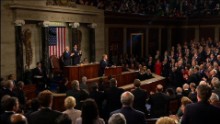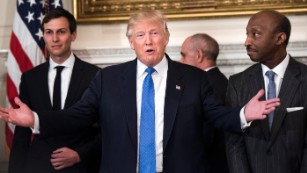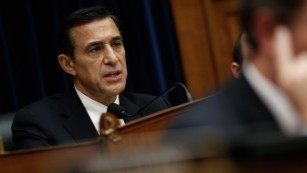Trump strikes softer tone in outlining ambitious vision
President Donald Trump sought to shift his tone Tuesday during his first address to Congress, striking notes of inspiration and common national purpose and leaving behind the darker aspects of his speeches at the inauguration and the Republican National Convention.
Trump opened his address by condemning the recent spate of threats against Jewish community centers, vandalism at Jewish cemeteries and the shooting of two Indian men in Kansas.
"Recent threats targeting Jewish Community Centers and vandalism of Jewish cemeteries, as well as last week's shooting in Kansas City, remind us that while we may be a nation divided on policies, we are a country that stands united in condemning hate and evil in all its very ugly forms," he said.
The comment came after Trump has come under heavy criticism for not addressing such violence.
He entered the House chamber to thunderous applause and spoke of the "renewal of the American spirit."
Trump proposes $54 billion in cuts to 'most federal agencies'
In the emotional high point of the speech, Trump turned to the first lady's box and acknowledged Carryn Owens, the widow of a US Navy Special operator, William "Ryan" Owens, who was killed in an anti-terror raid in Yemen in the first major military engagement of the new administration.
"Ryan died as he lived: a warrior, and a hero -- battling against terrorism and securing our nation," Trump said as the House floor erupted in a prolonged standing ovation. Owens, with tears streaming down her face, looked to the heavens and joined in the applause.
Trump still struck hardline notes. He overruled national security adviser H.R. McMaster, according to a senior administration official, to warn of "radical Islamic terrorism." Striking themes familiar from his campaign, Trump vowed to restore "integrity and the rule of law to our borders."
"We will soon begin the construction of a great, great wall along our southern border," Trump said, drawing raucous Republican cheers even as he didn't mention his earlier promise that Mexico would pay for construction.
While such language could please conservatives, Trump is on Capitol Hill after sending shockwaves through Washington earlier Tuesday by telling reporters he wants to pass an immigration reform bill that could grant legal status to millions of undocumented immigrants living in the US.
"The time is right for an immigration bill as long as there is compromise on both sides," Trump said at the White House.
So far there is little sign that the new President's legislative agenda, which includes repealing and replacing Obamacare, a big tax overhaul, and a trillion-dollar infrastructure program, is anywhere near coming to fruition. That could quickly turn out to be a problem for the President because there is only so much he can do by flexing his power through executive orders -- his main method to date of showing that he is leading the nation in a new direction.
Under pressure
He is under pressure to issue marching orders for Republicans who have been attacked in their home districts over a lack of specifics about key planks of the Trump agenda. There are no concrete plans yet to provide Americans with a workable alternative to the Affordable Care Act -- a reality that is fast eroding Republican political capital. But Trump promised a much better system than the one that formed the centerpiece of Obama's political legacy.
A new system, he said, must retain coverage for Americans with pre-existing conditions, should offer plans backed by tax credits and expanded Health Savings Account and should preserve Medicaid expansion in the states. Trump also vowed to bring down the high price of drugs "immediately."
"Obamacare is collapsing -- and we must act decisively to protect all Americans," he said, "Action is not a choice -- it is a necessity."
House Democratic Leader Nancy Pelosi, who was instrumental in passing the law, shook her head as Trump condemned it.
Republicans brace for Trump's prime-time message on Obamacare
The President will also signal action on another key piece of his agenda -- tax reform.
"My economic team is developing historic tax reform that will reduce the tax rate on our companies so they can compete and thrive anywhere and with anyone. At the same time we will provide massive tax relief for the middle class," Trump will say, according to the excerpts.
Buying time
The President needed to use Tuesday's address to buy himself some political time. Trump's approval ratings are hovering at depths never seen for a modern president so early in his administration. Some 44% of Americans approve of the job Trump is doing, while 48% disapprove, according to a new NBC/Wall Street Journal poll published on Sunday.
Trump remains a highly divisive figure, after the most negative presidential campaign on record, although has consolidated the support of many Republicans. Still, his White House is struggling to fend off a controversy about alleged ties between his campaign and Russia.
Issa renews call for independent prosecutor on Russia
Trump's fast start in office, engineered by a flurry of executive orders fulfilling campaign vows was meanwhile derailed by the chaotic rollout of his travel entry ban on the citizens of seven predominately Muslim nations, which was stayed by federal courts. An amended plan is due to be unveiled this week, so Trump has a chance to explain the need for the ban to voters in a way he neglected to do the first time around.
The address also comes at a moment when the White House is fleshing out the ideological foundation of the Trump presidency. The President's top political aide Steve Bannon spoke last week at the Conservative Political Action Conference of a relentless effort to dismantle the "administrative state" and a crusade against regulations Republicans believe have crushed innovation and economic growth.
Trump's speech to the same meeting struck stark themes of economic nationalism and an America First foreign policy.
And in the first details of his forthcoming budget unveiled on Monday, Trump gave notice of a 10% spike in defense spending to be financed by steep cuts at other government departments and a reduction in foreign aid.
News Courtesy: www.cnn.com













